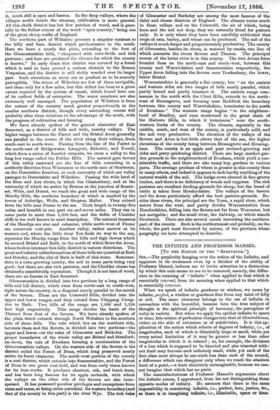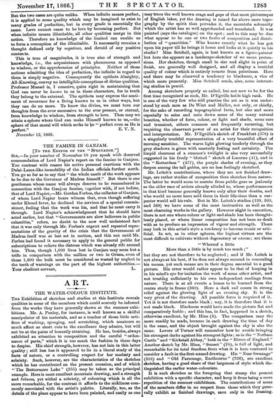THE INFINITE AND PROFESSOR MANSEL.
[To THE EDITOR OF THE "SPECTATOR."]
Sin,—The perplexity hanging over the notion of the Infinite, and apparent in its treatment even by a thinker of the ability of Professor Mensal, induces me to invite attention to a distinction by which this mist seems to me to be removed, namely, the differ- ence in the meaning of " infinite " when applied to that which is essentially internal, from its meaning when applied to that which is essentially external.
When we speak of infinite goodness or wisdom, we mean by infinite, perfect, a wisdom or goodness free from any taint of folly or evil. The same character belongs to the use of infinite in connection with the beautiful, because here the true subject of thought is the spiritual principle of harmony, the perception of unity in variety. But when we apply the epithet infinite to space or time, this notion of perfection changes into that of illimitableness, either on the side of extension or of subdivision. It is this ap- plication of the notion which admits of degrees of infinity, i.e., of magnitudes, each of which is illimitably large or small, while yet every actual limitation of it may be greater or leas than other magnitudes to which it is related ; as, for example, the divisions of a line which is supposed to be bisected and also trisected with- out limit may become each infinitely small, while yet each of the first class must always be one-sixth less than each of the second, a difference which can disappear only when we reach the absolute limit of a point,—a limit absolutely unimaginable, because we can- not imagine that which has no parts.
The unsatisfactoriness of Professor Mammal's arguments about the Infinite comes, I apprehend, from his not distinguishing these opposite modes of infinity. He assumes that them is the same impossibility in conceiving infinite, i.e., perfect, love, justice, 6rn., as there is in imagining infinite, i.e., illimitable, space or time. But the two cases are quite unlike. When infinite means perfect, it is applied to some quality which may be imagined to exist in many grades of perfection, but in every grade is essentially the same. Love cannot cease to be love by becoming perfect. But when infinite means illimitable, all other qualities merge in this notion. Therefore no knowledge of the limited can enable us to form a conception of the illimitable. It necessarily remains a thought defined only by negatives, and devoid of any positive contents.
This is true of magnitudes, it is true also of strength and knowledge, i.e., the acquaintance with phenomena as opposed to wisdom, or the apprehension of principles. Neither of these notions admitting the idea of perfection, the infinite in regard to them is simply negative. Consequently the epithets Almighty, All-Knowing, convey no intelligible conceptions of divine qualities. Professor Manse! is, I conceive, quite right in maintaining that God can never be known to us in these characters, for in truth they belong to the external. The epithets may express the senti- ment of reverence for a Being known to us in other ways, but they can do no more. To know the divine, we must turn our thoughts from the ever successive to the ever present, or eternal, from knowledge to wisdom, from strength to love. Thus may we attain a sphere where God can make Himself known to us,—the sphere of that moral will which seeks to lp "perfect even as He is































 Previous page
Previous page